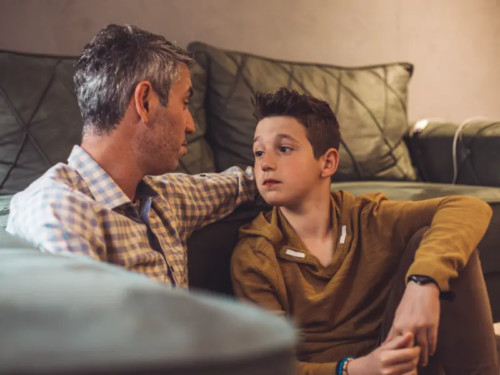
Table of Contents
How to Heal from Sexual Trauma
Written By: Charlie Health Editorial Team

Clinically Reviewed By: Dr. Don Gasparini
April 14, 2023
8 min.
Experiencing sexual abuse, assault, or violence can have a big impact on your life. Here’s how to heal from sexual trauma and take back control of your life.
Learn more about our Clinical Review Process
Table of Contents
If you’ve been a victim of sexual abuse, assault, or violence, you are not alone. Unfortunately, non-consensual sex acts are way too common. Among children and teens under 18, one out of four girls and one out of 13 boys have been sexually abused. As for adults, more than half of women and almost one-third of men have experienced sexual violence.
You can’t change the past, but you can learn how to heal from sexual trauma and move forward with your life. It’s possible to cope with the difficult emotions and memories surrounding your sexual assault, learn how to grow from the trauma and take care of your mental health for a brighter future.
Here are six tips for how to heal from sexual trauma.
1. Seek therapy from a mental health professional
Getting professional help after being a victim of sexual assault can change your life for the better. Therapy can aid in processing your trauma, understanding how it affects you today, and learning how to deal with it and push forward.
Common types of therapy for sexual trauma include:
- Cognitive behavioral therapy (CBT): CBT helps sexual assault survivors discover how thoughts, feelings, and behaviors are connected. When you become more conscious of your unhelpful behaviors and negative thoughts surrounding your trauma, you can change and shift into healthier patterns. You will also learn coping skills such as mindfulness techniques, breathing exercises, or grounding methods which help you stay present and calm when you’re having flashbacks about your sexual assault/sexual abuse or experiencing heightened emotions.
- Trauma-focused cognitive behavioral therapy (TF-CBT): TF-CBT is a form of CBT specifically designed for children or teens with trauma and their caretakers. There’s a combination of individual therapy and family therapy with caregivers. Young survivors get educated on the effects of trauma and learn how to deal with it, and caregivers can better comprehend the trauma and understand how to provide care to their loved ones. As a trauma survivor, you’ll learn emotional regulation, coping skills, and how to look at your trauma in a new light.
- Prolonged exposure (PE): PE is a type of exposure therapy that’s an offshoot of CBT. Survivors of sexual assault may engage in avoidance, steering clear of traumatic memories, places, or situations that remind them of their assault throughout their healing process. PE helps survivors gradually face triggers when they feel safe and ready to do so. Exposure enables you to retrain your brain to feel safer in these situations instead of continuing to fuel the fear with more avoidance.
- Eye movement desensitization and reprocessing therapy (EMDR): EMDR is a specific type of therapy designed to help people with post traumatic stress disorder (PTSD). To aid in the processing of traumatic memories, eye movements or another type of bilateral (left/right) stimulation are used. When memories are processed this way, the brain can store them and look at them in a less distressing way. Ultimately, EMDR therapy will make you less sensitive to the traumatic memories of your sexual assault.
Join the Charlie Health Library
Get mental health updates, research, insights, and resources directly to your inbox.
You can unsubscribe anytime.
2. Keep a strong support system
When you’ve gone through trauma, you may have times when you feel like withdrawing from everyone around you and being by yourself. However, isolation can end up harming your mental health.
A strong support system can be a game-changer as you continue with life after sexual assault/sexual abuse. Identify trusted loved ones with who you feel comfortable opening up about your trauma. Ideally, these people should be able to listen and sympathize in an understanding, compassionate, and non-judgemental way.
Research has found that social support (whether from family members, friends, romantic partners, or colleagues) can result in the following benefits:
- Reducing the risk of developing PTSD
- Reducing the risk of related adverse mental health effects such as self harm or depression
- Helping to lessen PTSD symptoms more quickly
- Promoting resiliency
- Promoting post-traumatic growth
3. Connect with other survivors
On top of having social support from your loved ones, it can be validating to connect with others who are in the same shoes as you. Talking to other people who are also sexual assault/sexual abuse survivors can help you feel less alone in your trauma. Sharing your story and listening to other people’s stories can help you feel seen, heard, and validated along your healing journey.
Depending on your personal preference and geographical location, there are support groups both in person and online. Ask your therapist or local mental health clinic for recommendations. Many major cities also have crisis centers for rape, sexual violence, and sexual assault victims. These centers may offer support groups or at least be able to point you in the right direction to find one.
If you live in a more remote location or would prefer online groups from the comfort of your home, a couple of options for survivors over 18 include Sexual Assault Support Services and Sexual Assault Survivors Anonymous.
4. Build healthy romantic/intimate relationships when you’re ready
Sexual trauma may complicate future romantic relationships. Research shows that some survivors of sexual assault/sexual abuse might be apprehensive about dating or might even completely avoid it. Additionally, some survivors with PTSD might have trouble connecting intimately with their partners or get triggered in intimate situations.
For these reasons, it’s important only to enter a romantic relationship if you feel ready. It’s crucial to feel safe with your partner, and this can be tricky after trauma.
Addressing your trauma in therapy with a trauma-informed professional can help you process and cope with your traumatic memories and triggers, helping you feel safer in romantic or intimate relationships.
Aside from therapy, here are some other tips for entering and maintaining relationships:
- Communication is critical. Your partner cannot read your mind, so you should tell them how you feel if you’re struggling or need something. Disclose your trauma when you feel safe and ready to do so if you think this will make you feel better and help your partner understand you more.
- Set clear boundaries. When it comes to all aspects of the relationship, including sex, setting boundaries is crucial to help you both feel comfortable and safe in the relationship.
- Stress the importance of consent. Since sexual assault/sexual abuse involves violation and a lack of consent, having a conversation about consent can provide some more assurance for you. No means no, and you can revoke consent at any time if you are not feeling comfortable anymore. Your partner needs to understand and respect this.
- Seek outside help. A couples therapist or a sex therapist can provide outside professional insight to assist you and your partner in furthering your relationship healthily.
- Be kind to yourself along the way, remembering that trauma affects everyone differently and that healing occurs at different paces. Have self-compassion and be patient with yourself.

5. Address sexual health concerns
Sexual assault/sexual abuse can lead to various sexual health concerns –– but this doesn’t mean you can’t have a healthy sex life after trauma.
According to the American College of Obstetricians and Gynecologists, some sexual health conditions that may affect women or people assigned female at birth after sexual assault include:
- Chronic abdominal or pelvic pain
- Pain during sexual intercourse
- Vaginismus
- Trouble with arousal
- Difficulty having an orgasm
Similarly, some research has shown that men or people assigned male at birth may have sexual health problems after sexual trauma, such as pain, low sex drive, and sexual dysfunction.
If you struggle with any of these ailments, you do not just have to accept them. There are doctors who understand what you are going through and have treatment options that can help reduce your symptoms so you can have a healthy and satisfying sex life after trauma.
See a doctor to discuss any sexual health concerns and get advice on what treatment could be. Mental health therapy, sex therapy, pelvic floor physical therapy, and other medical interventions can reduce your symptoms.
6. Practice self-care
As you continue to learn how to heal from sexual trauma, don’t forget to take care of yourself. Trauma and its effects can cause your mental and physical health to take a hit –– so it’s vital to do things that will benefit your overall well-being continuously.
Some self-care ideas include:
Stay physically active: Regular exercise is crucial for physical and mental health. Physical activity can boost your mood and help to relieve stress. Plus, research shows that exercise can reduce PTSD symptoms.
Eat healthily: Don’t underestimate the power of returning to the basics. A healthy and balanced diet is key for physical and mental health.
Sleep well: Getting enough good quality sleep is crucial for your physical and mental health. Sleep deprivation can worsen mental health conditions and prevent your brain from functioning optimally. According to the CDC, teens ages 13 and up should get eight to 10 hours of sleep, and young adults 18 and over should get at least seven hours.
Avoid alcohol and drugs: Alcohol and drugs can both worsen your mental health and lead to further complications such as dependence or substance use disorder. It’s best to stick to healthier, more productive coping mechanisms than turning to substances.
Get creative: Trauma can cause you to feel a wide array of emotions like sadness, anger, or shame. Finding a creative outlet for your emotions, like art or music, will allow you to express yourself in new, productive ways.
Practice mindfulness: Mindfulness and meditation can help you learn to be present at the moment without judging your feelings. These practices can help you reduce stress, gain clarity, and improve self-awareness, among numerous other benefits. Not to mention, studies have found that mindfulness can reduce PTSD symptoms, including self-blame and feelings of shame.
Do you need more support with
your mental health?
Charlie Health can help.
How Charlie Health can help
If you’re a teen or young adult who is a survivor of sexual trauma, Charlie Health may be able to help you.
Our virtual Intensive Outpatient Program provides personalized services and various treatment modalities for teens, young adults, and families dealing with mental health struggles such as sexual trauma. In our program, you’ll be matched with an experienced trauma-informed therapist who meets your specific needs. Plus, you’ll be connected with peers who face similar struggles to help you remember you are not alone.
Coping with sexual trauma isn’t easy –– but with trauma-informed care and a supportive community, you can push forward, grow, and thrive. Begin your healing journey with Charlie Health today.
References
https://link.springer.com/article/10.1007/s11126-022-10003-w
https://scholars.unh.edu/cgi/viewcontent.cgi?article=2429&context=thesis
https://journals.sagepub.com/doi/10.1177/1524838020939134
https://academic.oup.com/milmed/article/187/9-10/e1103/6444244





